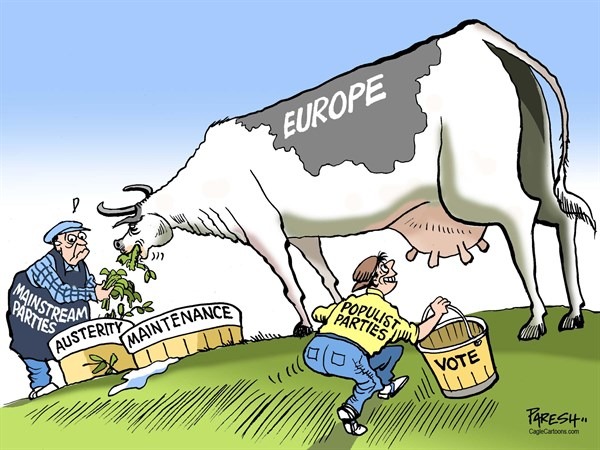The 2008 economic crisis hit a number of European Union (EU) countries by storm, with widespread patterns of electoral volatility and anti-incumbency effects for governing parties on both the left and right of the political spectrum. We argue that a central dimension of political competition in a number of EU countries was located around the emphasis placed on the immigration issue. They discuss competition on the immigration issue, particularly between populist radical right and centre right parties in the context of the 2008–13 economic crisis. They argue that in certain countries, specific ‘types’ of centre right parties were able to outperform the radical right electorally on the immigration issue in this electoral period.
The ‘Rise’ of the Far Right in Europe?
Recent times have seen the contemporary far right growing in popularity across Europe. The narrative of the international media has often focused on the ‘political earthquake’ that these far right parties have caused in Europe, through shaking up the mainstream political establishment. A number of European countries have seen a general ‘rise’ in electoral support for far right parties in national parliamentary elections this year, most notably in countries such as Germany, Austria, France and to a lesser extent, the Netherlands. Three key issues, corresponding to immigration concerns, dissatisfaction with the EU project and a lack of trust in mainstream parties are often attributed to have caused this increase in support.
At the same time, it is often assumed that the far right have monopolised and laid claim to ‘owning’ the immigration issue from mainstream parties on both the left and right. Recent research by Pardos-Prado has demonstrated that the far right’s ‘ownership’ of the immigration issue is not so clear cut. In some cases, centre right parties may shift their stances on the immigration issue, adopting more anti-immigrant stances that may serve as a strategy to counteract the electoral threat that far right parties pose on this issue.
Party Competition on the Immigration Issue
Building on recent research, we argue that mainstream centre right parties are better able to frame and position themselves on the immigration issue compared to party families such as the centre left. There are two primary reasons for this. Firstly, centre right parties are closer spatially to populist radical right parties on immigration positions than centre left parties often are. Centre right parties have also been known to adopt dynamic stances on immigration and there are numerous cases, such as in the United Kingdom, the Netherlands and France, where centre right parties have been ‘closer’ to radical right spaces and have also made the issue salient in their party manifestos, whilst some centre left parties have engaged with the immigration issue, they have generally seen mixed electoral fortunes on the immigration issue. Some scholars have also argued that centre left parties are more constrained on the immigration issue than centre right parties are, due to their internationalist outlook and thus been less willing to emphasise the issue.
Secondly, our focus on centre right – rather than centre left parties – is that the immigration issue is centrally linked to the core ideology of the right. The immigration issue is directly linked to key centre right issues such as keeping taxation low, maintaining law and order alongside national security that is likely to appeal to a core base of the centre right electorate. Recent research has demonstrated that centre right parties such as the People’s Party for Freedom and Democracy in the Netherlands (VVD) has historical precedence on the immigration issue, having adopted a co-optation strategy on the immigration issue in reaction to the far right List Pim Fortuyn’s electoral success in the early 2000s. These justifications aim to provide a clear rationale for why our theory focuses specifically on the centre right and populist radical right party families.
Issue Salience Matters
Our theory argues that centre right parties recognized the 2008 economic crisis as a time of greater voter volatility (anti-incumbency effects) during which the populist radical right seeks to secure more support through appeals over immigration. Examining parties’ electoral performances during the economic crisis in 24 European Union countries (the percentage change in vote share from the last two national parliamentary elections), we find that specific centre right parties sought to respond with a ‘strategic emphasis’ on the immigration issue to increase their electoral performance. A general trend for this pattern can be found in Figure 1 below, where centre right parties that emphasised immigration performed better electorally, compared to centre left and far right parties.
Whilst this effect is statistically significant, a closer inspection of the dataset showed that a specific ‘type’ of centre right party performed electorally better, namely ‘non-incumbent’/’challenger’ centre right parties that were not in government at the time of the economic crisis. Our results are also surprising as they depart from recent research that demonstrate the importance of issue positions. Instead, our findings correspond to the issue salience model of voting and the importance of centre right parties making the immigration issue a salient one in their party strategies; as opposed to adopting anti-immigrant stances. Tables 1 and 2 outline a summary of these specific cases below in more comprehensive detail.
Thus, ‘challenger’ centre right parties emphasised the immigration issue and performed electorally better or ‘matched’ the electoral success of the respective far right party. Examples include centre right parties such as the New Flemish Alliance Party (N-VA) in Belgium, alongside the People’s Party for Freedom and Democracy in the Netherlands (VVD). We also find that there are a number of centre right parties that do not perform electorally better during the economic crisis period; particularly when (i) they are incumbents and are punished in line with theories of economic voting (Union for a Popular Movement/UMP in France), or when (ii) they do not emphasise the immigration issue (the National Coalition Party/KOK in Finland). Far right parties such as the True Finns in Finland and the Front National arguably prospered as a result of these two conditions. Thus, these cases show that there are electoral restrictions to emphasising immigration in economic bad times, with potential electoral gains for populist radical right parties.
Figure 1: Regression Coefficient Plot with 95% Confidence Intervals (Inclusion of Control Variables)

Table 1: Centre Right and Populist Radical Right Party Competition in the Crisis Period, by Country & Election Years
| Centre Right outperformed Far Right (Electoral Success) | Centre Right andFar RightCompetition (Both achieved Electoral Success) | Far Right outperformed Centre Right (Electoral Success) | Centre Right performed better (countries without a Far Right Party) |
| Belgium (2007–2010) | Netherlands (2006–2010) | Finland (2007–2011) | Spain (2004–2008) |
| UK (2005–2010) | Hungary (2006–2010) | France (2007–2012) | Portugal (2005–2009) |
| Denmark (2007–2011) | Sweden (2006–2010) | Austria (2006–2008) | |
| Italy (2006–2008) | Greece (2007–2009) |
Source: Authors’ own
Table 2: Cases- Conditions of Centre Right–Far Right Party Competition on Immigration
| Country | C1: Electoral Volatility: Centre Right Incumbency–Punishment Effect | C2: ‘Incumbent Parties’ Centre Right ‘Incumbent’ Parties compete with the Far Right on Immigration | C3: ‘Challenger’ Parties Centre Right ‘Challenger’ Parties compete with the Far Right on Immigration (Emphasise Immigration) | Electoral Outcomes (‘Winners’) |
| Belgium (2007– 2010) | Yes | No | Yes | Centre Right ‘Challengers’ |
| Netherlands (2006–2010) | Yes | No | Yes | Centre Right and Far Right ‘Challengers’ |
| Finland (2007–2011)
| Yes | No | No** | Far Right ‘Challengers’ |
| France (2007–2012) | Yes | Yes | No** | Far Right* ‘Challengers’ |
Source: Authors’ own
Conclusion
We provide preliminary evidence for a ‘new electoral winning formula’ in this economic context, whereby centre right parties, particularly ‘challenger’ parties can profit electorally from this issue when they emphasised the immigration issue in times of economic crisis. In certain cases, the centre right can even perform better electorally than the populist radical right on this issue. We argue that centre right parties that were in opposition (such as N-VA in Belgium and VVD in the Netherlands) during economic downturns were not tainted by anti-incumbency effects and therefore had more freedom to compete on the immigration issue with populist radical right parties.
The results here have implications for contemporary party competition in suggesting that specific ‘types’ of centre right parties have the potential to benefit electorally from emphasising the immigration issue in specific economic contexts. Whilst these empirical findings do point to the electoral success of certain centre right parties in being able to challenge and in some cases outperform the populist radical right on their core issue of immigration during periods of economic crisis, there are a number of situations where the centre right perform electorally worse; particularly when (i) they are incumbents, or when (ii) they do not emphasise the immigration issue in their party strategies. These cases show that there are electoral restrictions to emphasising immigration in economic bad times, with potential electoral gains for populist radical right parties. Future research should seek to understanding further the electoral success of the centre right across Europe in different economic contexts; through investigating how centre right and radical right parties emphasised the issue of immigration outside periods of economic crisis, specifically in the context of the ongoing refugee crisis.
A revised version of this article appeared in Democratic Audit, based at the London School of Economics and Political Science back in December 2017.
This piece is based on the forthcoming paper (to be published in Electoral Studies) entitled “Centre Right and Radical Right Party Competition in Europe: Strategic Emphasis on Immigration, Anti-Incumbency, and Economic Crisis”.
About the authors
Dr. James F. Downes (Twitter @JamesFDownes) is a Lecturer in Comparative Politics in the Department of Government and Public Administration at the Chinese University of Hong Kong. He is also an Affiliated Visiting Research Fellow (Honorary) at the Europe Asia Policy Centre for Comparative Research. He is an early career researcher whose research interests are diverse, currently focusing on European Party Politics: Party Competition on Immigration; Decline of Social Democratic Parties in the 21st century and Asian Politics: Themes of Nationalism and Identity in Hong Kong.
 Dr. Matthew Loveless, Jean Monnet Fellow at the European University Institute)
Dr. Matthew Loveless, Jean Monnet Fellow at the European University Institute)



